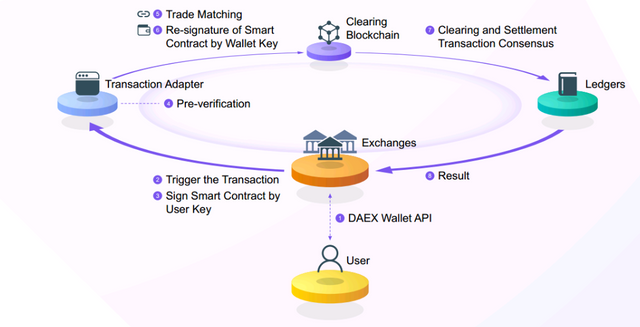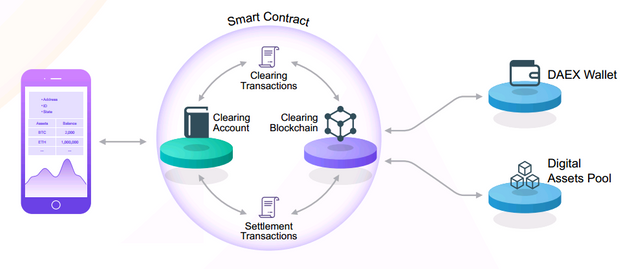
 |
 |
 |
Another Exchange Problem
Another issue with cryptocurrency exchanges is how transactions are cleared and settled via their platforms. As cryptocurrencies exist within an unregulated space, clearing and settlement cannot occur through traditional, regulated channels, making clearing and settlement risks abnormally high. Exchanges aren’t willing to act as anything other than a third party that only arranges trades between buyers and sellers. This means that they are not a direct counterparty to every transaction that takes place and so are not bearing much responsibility for what takes place on their platforms. However, it must be said that they do act as a counterparty where they can correctly make margin calls in time to recoup funds from the wrong sides of contracts.
DAEX Clearing Ecosystem
The clearing chain is the core of the DAEX clearing ecosystem. This clearing is open source clearing solution based on distributed ledger technology. DAEX provides clearing and settlement services for individual and institutional users. This chain is used in several nodes on a public cloud. This uses one type of POS consensus mechanism to validate transactions. DAEX Ecosystem has work with 3 value, "Clearing Contract", "Clearing Mechanism" and "Clearing Account". Here's the explanation :
Clearing Contract

All clearing and settlement business rule share preprogrammed into this clearing contract. This smart contract finishes the whole clearing and settlement cycle of a matched trade.

After a matched trade is formed in a DAEX participating exchange, it is sent tothe clearing chain. A clearing smart contract is then formed for this matched trade. This clearing smart contract will first validate the matched trade to make sure that it meets all the business requirements. After the validation, the smart contract goes through the consensus mechanism and then updates corresponding accounts on the ledger.
Clearing Mechanism

DAEX customizes a specialized consensus mechanism based on clearing value factor (CVF-POS). The high performance of CVF-POS will avoid the centralization of computing power and clearing power through technology democratization, expanding network effect with relatively low network cost, reaching relative decentralization. The clearing responsibility mechanism can identify a process that leads to mistakes in consensus, and perform punishments according clearing rules.
Clearing Account

This account is used to registered digital assets, keep asset balances and clearing history. DAEX participating exchanges use one clearing ledger, customer accounts are created and managed on the same ledger. Customers’ trading assets are also managed on the same ledger. DAEX uses are open and transparent to exchanges and traders, DAEX thus provides them with a reliable and trustworthy clearing and settlement service.

Users can use wallets that meet DAEX specification to access and manage their trading assets on the clearing chain. The DAEX clearing service is different from existing clearing services. Its service is accessible to all regions of the world and it is not regulated by any regulation body in the world.
Clearing Protocol

Daex has a innovative ecosystem and different from the others clearing system. In the DAEX ecosystem, business standards and protocols such as clearing protocol, data structure, and encryption standard are made collectively and implemented by technology. Here's the structure table of clearing Request and Reply :
Structure of Clearing Request
| Header | Version | Version number of the protocol |
| Channel | Channel specification | |
| Requester | Requester’s ID | |
| Timestamp | Request timestamp | |
| Business ID | Message ID to identify one clearing process | |
| Module | Clearing chain service element: exchange or wallet | |
| Body | Method | Clearing method such as spot trade, option or future |
| Params | Structured parameters containing user identification, type of matched trade, trade time, quantity, etc. | |
| Encryption | Encryption parameters specified by connecting parties | |
| Nonce | Random number | |
| Tag | Extension field for length control |
Structure of Clearing Reply
| Header | Version | Version number of the protocol |
| Channel | Channel specification | |
| Requester | Requester ID | |
| Timestamp | Clearing process finish timestamp | |
| Business ID | Clearing request ID | |
| Message | Code | Clearing return Code |
| Message | Clearing return Message |
More Detail :
DAEX Website : https://www.daex.io
DAEX Paper : https://www.daex.io/daexPaper.do
Author :

Bitcointalk Profile Link : Click Here
ETH Address :
0x596D7084059fe41C237449584163045c3990308c